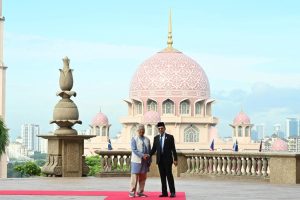During the visit of Chief Advisor of Bangladesh’s interim government Muhammad Yunus to Malaysia on August 11-13, the two sides signed five Memorandums of Understanding and three Exchanges of Notes, covering defense, energy, trade, education, diplomatic training, the halal industry, and migrant workers issues.
The two sides pledged to develop a free trade agreement, improve protections for Bangladeshi migrant workers, and step up cooperation in renewable energy and the blue economy. Yunus urged investors in Malaysia to invest in Bangladesh. As for Malaysia, it promised to join an ASEAN-led mission on the Rohingya issue, a crisis that has deeply affected Bangladesh for a long time. The agreements signed during Yunus’ visit signal that the two countries are looking to deepen ties beyond trade and migration.
Among the big outcomes of Yunus’ recent visit was the MoU on defense. This is the first time that Malaysia and Bangladesh have agreed on a framework for joint military training, and intelligence and security cooperation in the Bay of Bengal and the Strait of Malacca. Through such cooperation, Malaysia and Bangladesh have signaled that they would stand together in securing these seas and guiding the strategic flows of these regions. The defense MoU could also open the door for defense industry cooperation and technology transfers, enabling Bangladesh to modernize its military even as it helps Malaysia diversify its defense industry.
Yunus’ trip came less than a year after Malaysian Prime Minister Anwar Ibrahim visited Bangladesh. It was on October 4, 2024, that Anwar and his 58-member delegation landed in Dhaka. Bangladesh was still roiled in uncertainty; only two months earlier, Hasina’s 15-year-long authoritarian rule had ended, following weeks of student-led mass protests that had left around 1,400 people dead and thousands injured.
The fall of the Hasina government left Bangladesh in a raw state, and its institutions shaken, even on the brink of collapse. The Bangladeshi people were caught in uncertainty over old grief and the promise of a new Bangladesh as Yunus took charge of the interim government.
Anwar was the first foreign leader to visit Bangladesh since the fall of the Hasina government. It was a clear sign of solidarity, which served as a reminder to Dhaka that it was not alone in its moment of transition.
For Anwar, the visit was an opportunity to increase Malaysian influence in Bangladesh amid its changing political landscape, and to strengthen Malaysia’s stakes in the South Asian region through Bangladesh.
Malaysia’s historic relationship with Bangladesh gave Anwar’s visit deeper resonance. In 1972, Malaysia was among the first Muslim-majority countries to recognize Bangladesh’s independence. By visiting post-Hasina Dhaka, Anwar revived that symbolic connection, aligning Malaysia as a reliable friend of Bangladesh.
During his visit to Malaysia, Yunus described Bangladesh’s political situation as a “magnitude-9 earthquake” that shook every institution and laid bare problems that have been brewing for a long time. His words conveyed the nation’s struggles and the hope of the future ahead, presenting Bangladesh not as a country in need of stability, but one that was in the process of reform. Yunus also let Malaysia know that its support to Bangladesh during its difficult times would be remembered always.
Bangladesh’s outreach to Malaysia also stems from Dhaka’s desire to diversify its foreign policy with regional powers. Traditionally, Dhaka has maintained close economic and political relations with New Delhi and Beijing, particularly in the fields of infrastructure and investment projects.
Trade between Bangladesh and Malaysia has been growing continuously. Two-way trade was worth almost $2.92 billion in 2024, a 5.1 percent increase from the previous year. However, the trade balance is in Malaysia’s favor. Bangladesh is Malaysia’s second biggest trading partner in South Asia, with Malaysia exporting petroleum products, palm oil and chemicals to Bangladesh, and importing footwear, textiles and manufactured products.
Visa problems are an important obstacle in the way of Bangladeshi nationals traveling to Southeast Asian countries, especially over the past year. Vietnam is not issuing visas to Bangladeshis due to security concerns since the regime change in Dhaka. It takes Bangladeshis 40-60 days to secure a Thai visa these days, compared to barely two weeks a year ago. While Bangladeshis find it easier to get a visa for Malaysia than for other Southeast Asian countries, a growing number of Bangladeshis have been deported from Kuala Lumpur to Dhaka in recent months. This problem shows how hard it is for Bangladeshi nationals to access better economic prospects in Southeast Asia despite their government’s attempts to build closer diplomatic and economic relations with the region.
Migrant workers are the cornerstone of Bangladesh-Malaysia ties. As many as 898,970 Bangladeshis are working in Malaysia’s construction zones, factories, and plantations, and they remit money back home. But exploitation and horrific working conditions cast a shadow on the migrants’ quest for jobs abroad. The bilateral discussions during Yunus’ visit resulted in pledges to ensure fair wages and better working conditions.
Despite these efforts, there are significant challenges to the bilateral relationship. First, without overhauling the recruitment system, in which middlemen charge Bangladeshi migrants exorbitant fees, both governments risk perpetuating this cycle of exploitation.
Second, there will have to be serious policy initiatives to stimulate trade diversification. Bangladeshi ready-made garments face competition from other regional rivals, especially following Trump’s tariffs. Malaysia and Bangladesh have to look to other sectors, such as digital services, halal industries, and renewable energy to boost bilateral trade.
Third is the political instability in Dhaka. If the interim government begins to face difficulties in organizing free and fair elections within the promised timeframe, Anwar could come under criticism for legitimizing an unelected regime. Furthermore, it is also unclear what stance Bangladesh’s post-election government will take.

































